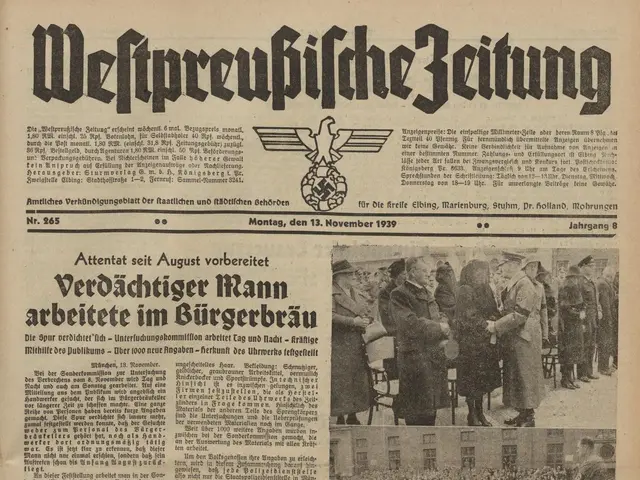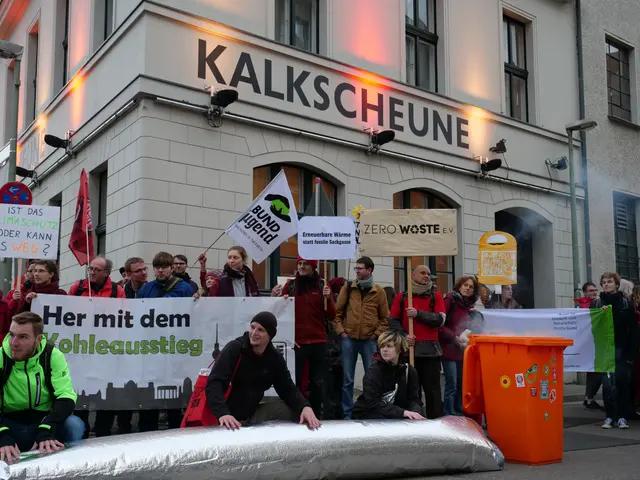Spain Assumes Command of NATO's Air Defense Reinforcement in Lithuania, Deploying Eight Eurofighter Aircraft
Spanish Air Force Takes Over NATO's Air Policing Operations in Lithuania
The Air Tactical Detachment (DAT) Vilkas of the Spanish Air and Space Force (EA) has assumed command of NATO's enhanced Air Policing operations in Lithuania, safeguarding the airspace of NATO member countries in the Baltic region.
The change of command was attended by the Spanish Ambassador to Lithuania, José Fernando Fernández-Aguayo Muñoz, and Colonel Antonio Miguel Romón Almansa, who represented the Operations Command. Colonel César Miguel Pérez Moriano, commander of Morón Air Base and Wing 11, also participated in the event.
Spain has contributed eight Eurofighter aircraft for these operations. DAT Vilkas has deployed eight of its most advanced weapon systems, along with necessary equipment, for the NATO mission in Lithuania. Approximately 150 aviators from up to 15 different units of the Air and Space Force are part of DAT Vilkas.
The main objective of DAT Vilkas is to collaborate in preserving and protecting the airspace of NATO member countries. The detachment will remain in Lithuania for the next four months in the service of the Alliance.
The current NATO enhanced Air Policing (eAP) operation in Lithuania is part of the broader Baltic Air Policing mission that provides airspace protection over the Baltic states, including Lithuania, Latvia, and Estonia. NATO fighter jets based in Šiauliai (Lithuania) and Ämari (Estonia) conduct this mission to safeguard the airspace, as the Baltic states themselves do not have combat aircraft of their own.
Other countries participating in the mission include Italy, which contributes its fighter aircraft and air defense units, including the deployment of the SAMP/T long-range ground-based air defense system during exercises in Lithuania in early 2025. Hungary has also deployed 4 Gripen aircraft for the same operations.
Eurofighter Typhoon jets are part of NATO’s enhanced Air Policing deployments in the region, conducting operations including hot refueling at bases such as Mihail Kogălniceanu Air Base in Romania, supporting NATO air policing tasks across the eastern flank.
The exact roster of all NATO countries rotating air policing jets in Lithuania varies over time, but the mission is continuously staffed by NATO allies contributing fighter jets to this forward presence to secure the Baltic airspace against provocations such as recent Russian drone incursions.
In response to multiple drone violations in 2025, including incursions by Russian Gerbera loitering munitions crossing from Belarus into Lithuanian airspace, Lithuania has requested NATO to reinforce and accelerate enhanced air defense deployments to close gaps in Baltic airspace protection.
The Baltic Air Police (BAP) will be led from Siauliai. Lithuania’s enhanced Air Policing operation under NATO is a multinational effort primarily involving rotating fighter jets (such as Eurofighters) from several NATO allies deployed at Šiauliai Air Base, supported by air defense battalions including Italian systems on the ground, all coordinated to provide persistent air surveillance and rapid reaction capability over Lithuania and the Baltic region.
As Spain takes control of NATO's Air Policing operations in Lithuania, the aerospace industry plays a crucial role with the deployment of eight Eurofighter aircraft from the Spanish Air and Space Force. The finance industry also contributes significantly, as managing the deployment and maintenance of these aircraft requires substantial resources. The weather conditions in Lithuania will undoubtedly have an impact on the operations, and the aviators must be prepared to adjust their strategies accordingly.








